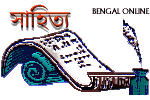 |
|
Bengali Poetry |
|
|
|
Bengali Prose
|
|
|
|
Bengali Prose
History of Bengali prose is relatively new. Bengali prose form was largely developed and introduced by the missionaries
of Serampore and by the Fort William College. Both had pragmatic and utilitarian ends in mind.
New British officers of the East India Company were taught Bengali so that they could converse with the natives. To this end
Nathaniel B. Halhead published the Bengali grammar in 1778 - the title page clearly stated this obvious purpose. After Fort William
College was established in 1800, the pundits were charged with the development of Bengali prose for the benefit of the English
Administration. The missionaries of Serampore, under the able guidance of William Carey (1761-1834; British orientalist and missionary born at
Paulerspury, Northamptonshire, co-founder of the Particular Baptist Society, Professor of Sanskrit at the Fort William College), translated
the Bible into Bengali in 1801 for spreading Christianity - noted as the pioneering work in Bengali prose.
The Bengali prose thus developed in the early 19th century was nothing more than a cocktail of Sanskrit, Arabic and Persian
words and "was pitiably amorphous in from". The first Bengali book of prose written by a Bengalee was the text book
Raja Pratapaditya Charita published in 1801. The author was Ramram Basu who later wrote another book Lipimala.
In 1802, Batrisa Simhasana written by Mritunjaya Vidyalankar was published. It was certainly an improvement on Ramram Basu.
The same writer also published three other text-books: Hitopadesh, Rajabali and Prabodh Chandrika.
It was not until 1815 when Raja Rammohan Roy published his first book of prose called Vedanta Grantha that a break with
the tradition was established. The influence of Sanscrit, Arabic and Persian words was minimised. In 15 years, from 1815 to 1830,
Rammohun wrote thirty books in Bengali. According to Soumendranath Tagore, "the excellence that the Bengali prose [later]
achieved in literary form under Bankim Chandra and Rabindranath owes its beginning to the Bengali prose developed by Rammohan". The
above observation appears quite valid except in one detail. It does not accord any recognition to the pioneering work done by such writer as
Iswar Chandra Vidyasagar, Pyarichand Mitra and Tekchand Thakur.
Indeed, Rabindranath Tagore regarded Vidyasagar (inspite of the fact that he was not a pure literary figure) as the father of Bengali prose.
Evidently, English style short stories, novels and plays are of relatively modern origin in the Bengali literature. Despite its late beginning, Bengali prose
soon went through a complete course of evolution since then, rather quickly. According to Professor Sukumar Sen, the evolution of Bengali novelist traditon can be
separated into four well-defined periods.

|

